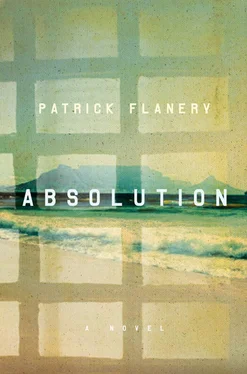‘It is a simple system, ladies and gentlemen, not unlike a fishing rod, but with an almost opposite purpose, as you can see here. The cages, made of ultra light titanium, are tethered to these gear mechanisms, which can drag them on their cables up beyond the reach of high tide, or allow them slack enough to be pulled out by the retreating waves as much as half a kilometre into deep water, depending on what’s required. On this stretch of beach, very secluded — an hour’s drive to the perimeter fence, as you well know, and another hour still to the nearest artery — there are twenty-five cages, usually operating at full capacity.’
‘What are the dimensions?’
‘Each cage is a metre square and three metres tall, and inside, along the vertical axis, is a pole, with an adjustable crossbar that can be raised or lowered according to the height of the detainee’s shoulders; it’s essential that there always be a good fit, so the detainee is held securely in position, even when submerged. Shackles at the feet, the neck, and the wrists hold each detainee in place, and these are also adjustable, so there’s no chance that someone could slip out when wet, and swim to the top of the cage.’
‘Even then, they wouldn’t be able to escape, would they?’
‘No, but they might be able to catch a breath.’
The memories were very clear, the early ones; it was your grasp of the recent past that was insecure. You knew the first time you had walked on a beach, when you were two, with your father and me and your brother, and could feel your red swimming suit with its yellow fish design tight against your skin. You could remember the first steps you had taken, wholly unafraid, for you knew all about the ocean, knew it was for swimming, knew also that it was colder than it looked. You had marched into the surf and began paddling with confidence, your father and I swimming on either side. There was the thrill of the buoyancy, which made swimming easier than in the dam on the farm, but also the force of the waves, which made you work harder. After ten minutes in the water you were ready to rest on the beach, to let your chest rise and swell in time with the surf, hair salty, stringy round your face as you watched the waves approach and recede. Collapsing on your back, you stared at the white-blue sky until your father opened an umbrella to shade us.
‘If you watch the one closest to us, you can see that we’ve given the tether substantial slack, and the water is already around her ankles. Not long now and the waves will take the cage out into the surf, and that’s what we call the “testing threshold”. If they withstand that without screaming, then we know there’s no breaking them, and we might as well just let them go all the way. It’s a clean system, too, because once we’ve let them out to five hundred metres, there’s an automatic release function, which opens the cage to predators, to sharks and the like, and we just leave them out there until we see a little activity in the water, and then we know we can bring the cage back in, more or less empty.’
‘So there’s no burial necessary.’
‘Anything left over is incinerated. Sometimes the predators take everything. What we call a “clean sweep”. No work for us to do but put the next one in.’
‘But there are some, presumably, who do break?’
‘Like that fellow over there, the one who screamed a few minutes ago. You see, my men have gone out into the water, they’re getting what they need to get from him, and if he doesn’t give them everything they want, then back he goes. Sometimes it takes a dozen trips out before they realize we’re serious; they scream every time, but don’t tell us everything we want to hear, and back they go. Ones like that always break down eventually, though. It’s the most efficient system we’ve found, and it serves an ecological function, too. Fish stocks in the area have increased ten-fold over the last three years.’
‘This is the court of last resort, so to speak, for the hardest cases.’
‘These are the ones who’ve been through everything else and still not cracked. I can’t explain what it is about the ocean, some kind of natural rhythm that just scares the hell out of them. We figured out how to do it best, too. You leave them out for a day, in a secure position, and let them roast. Then the next morning, after they’ve been shivering all night from the burns, we drag the cages down to the water line and let the tide start to work its magic. It’s a beautiful thing to watch. There’s something redemptive about it.’
Your fingers and toes were throbbing and burning as the salt worked on the exposed tissue where the nails had been torn away, and the sores that covered your back were alive with sand kicked up by the breeze and the persistent sting of fleas. You were aware that you were beginning to burn when you chafed your bare thighs together or shifted your wrists in their shackles. The inside of your mouth was cottony and you closed your eyes to preserve the little moisture that remained. Sleep was impossible because of the strength required to hold yourself in place; if you relaxed, the shackles at your wrists and ankles would cut into your flesh, and it would be a short time before they began to cut into bone. I have resisted this long, I can go longer. It is not like illness or fever, not even like shame. Nakedness no longer matters. They can do what they want to me, they can watch me pissing and shitting myself, if I had anything left inside me to piss or shit. No food in my stomach to vomit, not even bile. This is not the worst they have done. This is almost a reprieve .
Suspension over sand might not have the hot flush of shame, or the chills of sickness, but was nonetheless both hot and cold. Shame had been rife indoors. You did not want to remember what they had done to shame you; it was impossible to return to that and still remain yourself.
You could hear the voices of the guards and the officials who accompanied them, but couldn’t catch individual words; they were spending more time watching than you would have expected, as if they were attending a test match, with lunch and tea breaks. Turning your head to one side or another, you could see cages just like yours, stretching out on either side, nine to the left, fifteen to the right, the furthest at the limits of your vision; some were in line with your cage, others were closer to the water. In the cage to your left was a young woman. Like you she was steeling her body, holding it in place so that the shackles would not cut into her extremities. You thought you recognized her from inside, but without any hair, and several metres distant, it was difficult to be sure. You clicked at her, as you had taught yourselves to do, but she did not respond; perhaps she had gone elsewhere, travelling. The guards were too far away to take any notice of what you were doing. Turning your head to the right, you found the cage on that side was closer, and you recognized a friend from inside. Together you had learned the ancient alphabet, taught by one of the first prisoners, the knowledge passed down over the years. To the guards, it was only noise, mumbo jumbo.
‘Hello, friend. They’re not watching us.’
‘Did they bring you this morning?’
‘I don’t know. You should hold yourself up. Your wrists.’
‘It’s all over tomorrow, either way.’
You tried to remember how long you had been friends. You had met at least five years before being captured. Your bodies had not changed markedly; you were thinner now, your faces drawn, but you were still recognizable as yourselves.
‘I won’t scream. Will you?’
‘No.’
There was no point in screaming. You thought you knew what it would be like to drown, you had almost done it at the age of three in the deep end of a pool. At first you had panicked, forced to swim out from the ladder into the depths, and then, finding yourself dropping to the bottom of the pool, you had relaxed, come to the end of your air, and suddenly found yourself on the concrete poolside, the mouth of the swimming instructor clamped on your own, the wrinkles in her face dripping with water, and a crescent of other children standing near you, looking curiously as the great fat woman breathed the world back into you. It was not so bad almost drowning; I would have preferred it to resuscitation. Why did I panic? I knew how to swim; I swam before I walked. I was talking to someone, a boy with brown hair, and I was trying to tread water, and then I was under the surface, falling past those other small bodies, and the round abdomen of the swimming instructor .
Читать дальше












